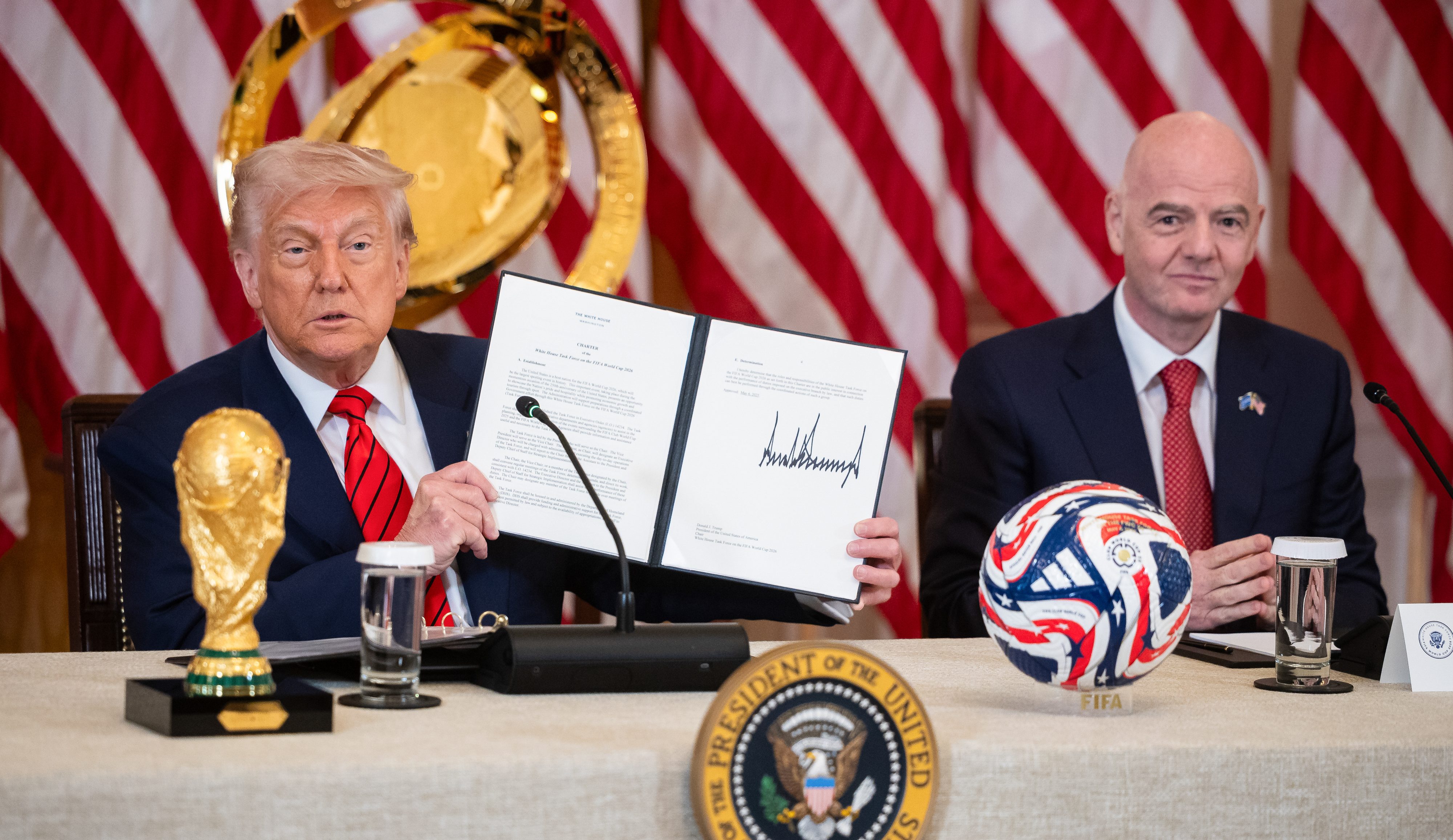World Cup Visa Warning: Don't Overstay, Trump Cabinet Warns!
World Cup Warning: Trump's Cabinet Sends Visa Overstay Message to FIFA Visitors
Introduction: A Global Game, A Local Responsibility
Get ready, soccer fans! The FIFA World Cup is heading to North America, and the excitement is palpable. But amidst the cheers and fanfare, the Trump administration is sending a clear message: enjoy the games, but respect the rules. It's like having a fantastic party at your house – you want everyone to have a blast, but you also expect them to leave when it's over, right? This article dives deep into the government's stance on visa compliance during the World Cup, offering insights, analysis, and practical information for potential visitors.
The U.S. Prepares to Host the World: A Balancing Act
Next year's FIFA World Cup, co-hosted by the U.S., Mexico, and Canada, is anticipated to be a massive event. Millions of fans are expected to descend upon North America, eager to witness the world's greatest soccer spectacle. The U.S. government faces the challenge of welcoming this influx of visitors while ensuring the integrity of its immigration laws. It's a tightrope walk – balancing hospitality with security.
JD Vance's Welcoming Words, and a Not-So-Subtle Reminder
Vice President JD Vance struck a welcoming tone at a recent World Cup task force meeting, emphasizing that everyone is invited to "come and see this incredible event." Sounds great, right? But there was a catch. He followed up with a reminder that when the time is up, visitors are expected to return home. Otherwise, they might have to "talk to Secretary Noem." It's like saying, "Mi casa es su casa, but remember to pack your bags eventually!"
Secretary Noem: The Immigration Enforcement Enforcer
The mention of Homeland Security Secretary Kristi Noem adds weight to the message. She's been at the forefront of the administration's immigration enforcement efforts, and her involvement signals a zero-tolerance policy for visa overstays. Think of her as the designated "responsible adult" at the party, making sure everyone behaves.
The Economic Impact: Why the U.S. Wants a Smooth Operation
Hosting the World Cup is a significant economic opportunity for the U.S. Hotels, restaurants, and tourist attractions are expected to see a surge in business. However, illegal immigration and visa overstays can strain resources and create security concerns, potentially dampening the economic benefits. A well-managed World Cup, with visitors adhering to visa regulations, is crucial for maximizing the positive economic impact. It's like ensuring the party is a success, not a chaotic free-for-all.
Addressing Concerns: Is the U.S. Being Too Strict?
Some might argue that the administration's stance is overly strict, potentially deterring visitors and damaging the U.S.'s reputation as a welcoming nation. However, the government's perspective is that enforcing visa regulations is essential for national security and maintaining the rule of law. It's a question of priorities – balancing the desire to host a successful event with the responsibility to protect the country.
Understanding U.S. Visa Regulations: A Quick Guide for Visitors
Navigating U.S. visa regulations can be tricky. It's important for potential visitors to understand the terms of their visas, including the duration of stay and any restrictions on activities.
- Check your visa expiration date carefully. Don't assume you can stay until the end of the World Cup if your visa expires sooner.
- Be aware of the activities allowed under your visa. Tourist visas generally don't allow for employment or long-term study.
- If you need to extend your stay, apply for an extension before your visa expires. Don't wait until the last minute.
The Role of FIFA: Balancing Sports and Security
FIFA, the governing body of international soccer, also has a role to play in ensuring a smooth and secure World Cup. They work closely with host countries to address logistical and security challenges. It's a partnership – FIFA brings the soccer expertise, and the host country provides the infrastructure and security.
Immigration Enforcement: What Happens if You Overstay Your Visa?
Overstaying a visa can have serious consequences, including deportation, restrictions on future travel to the U.S., and difficulty obtaining visas for other countries. The U.S. government has sophisticated systems for tracking visa compliance, and overstays are often detected. Don't risk it! It's better to leave on time than face the consequences of violating U.S. immigration law.
Beyond the World Cup: The Broader Immigration Debate
The World Cup visa issue is just one facet of the larger immigration debate in the U.S. Immigration policy is a complex and often contentious issue, with strong opinions on both sides. The administration's focus on visa enforcement reflects its broader approach to immigration, prioritizing border security and compliance with existing laws.
The Importance of Planning: Tips for World Cup Travelers
Planning is key to a successful and stress-free World Cup trip. Book your flights and accommodations well in advance, secure your visas promptly, and familiarize yourself with local customs and laws.
- Start planning now! Don't wait until the last minute to make travel arrangements.
- Make copies of your passport and visa. Keep them separate from the originals in case of loss or theft.
- Learn some basic phrases in English, Spanish, or French, depending on where you'll be traveling.
The Power of Collaboration: U.S., Mexico, and Canada Working Together
Hosting the World Cup is a collaborative effort between the U.S., Mexico, and Canada. The three countries are working together to coordinate security, transportation, and other logistical aspects of the event. It's a demonstration of international cooperation, showcasing the power of sports to bring nations together.
H3: The Security Challenges of a Global Event
Major sporting events like the World Cup are potential targets for terrorism and other security threats. The host countries must implement robust security measures to protect players, fans, and infrastructure. This includes everything from airport security to crowd control at stadiums. It’s a multi-layered defense, designed to deter and prevent any potential attacks.
H3: The Role of Technology in Immigration Enforcement
Technology plays an increasingly important role in immigration enforcement. From facial recognition software to data analytics, the U.S. government uses a variety of tools to track visa holders and identify potential overstays. This technology helps to streamline the enforcement process and make it more efficient. Think of it as a high-tech watchdog, constantly monitoring visa compliance.
H3: The Importance of Cultural Sensitivity
Welcoming millions of visitors from around the world requires cultural sensitivity. The U.S. government and host communities must be prepared to accommodate diverse cultural needs and preferences. This includes providing multilingual services, respecting different customs, and promoting intercultural understanding. It’s about creating a welcoming and inclusive environment for all World Cup visitors.
The Long-Term Impact: What Happens After the World Cup?
The World Cup will leave a lasting impact on the U.S., both economically and socially. It will boost tourism, create jobs, and showcase the country to a global audience. However, it's important to ensure that the benefits are sustainable and that the legacy of the event is positive. It’s about using the World Cup as a catalyst for long-term growth and development.
Conclusion: Enjoy the Games, Respect the Rules
The message from the Trump administration is clear: the U.S. welcomes World Cup visitors, but expects them to abide by visa regulations. It’s a delicate balance between hospitality and security. By understanding the rules and planning ahead, visitors can ensure a smooth and enjoyable experience while contributing to a successful World Cup. So, get ready to cheer on your favorite team, but remember to pack your bags when the final whistle blows!
Frequently Asked Questions
- What happens if I accidentally overstay my visa?
Even accidental overstays can have serious consequences. Contact an immigration attorney immediately for guidance. The sooner you address the issue, the better your chances of resolving it favorably.
- Can I apply for asylum while in the U.S. on a tourist visa?
Yes, you can apply for asylum regardless of your visa status. However, it’s a complex legal process, and you should consult with an immigration attorney to assess your eligibility and understand the requirements.
- Will my visa be automatically extended because of the World Cup?
No, visas are not automatically extended. You must apply for an extension before your current visa expires if you wish to stay longer.
- What if I lose my passport and visa while in the U.S.?
Report the loss to the local police and your country's embassy or consulate immediately. They can help you obtain replacement documents.
- Are there any specific restrictions for visitors from certain countries?
Visa requirements and restrictions can vary depending on your country of citizenship. Check the U.S. Department of State website for the most up-to-date information.


